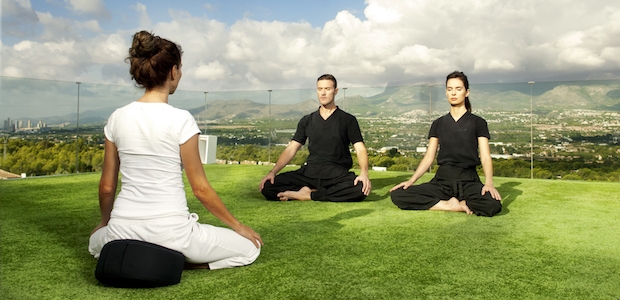
Meditation has become increasingly popular, with 8% of all Americans practising regularly today. The majority of those meditating seek stillness and mental strength, as well as a way to be more present in the moment. Extensive research has been done on the physical and mental benefits of meditation, and more and more businesses pick up on the trend. In fact, guided meditation classes are a great way for spas and wellness centres to broaden their range of services and extend their guest base. This article will present ways in which spas can integrate meditation into their offering and diversify their business.
Meditation (or dhyana – the seventh limb of yoga) is an ancient practice that has been around since prehistoric times according to millennia-old paintings discovered in northwest India depicting the use of mantras (words or phrases which are repeated mentally) as the beginning of meditation. Early records from around 1,500 BC describe how the practice was an essential aspect of Vedanta, one of the main philosophical schools of Hinduism. In the 5th century BC, other forms of meditation emerged, particularly in China and India, and over the years, most major religions incorporated meditation in one form or another as a way to develop spiritually. In combination with yoga, meditation was first introduced to the US in the 20th century by the gurus Swami Vivekananda and Paramehansa Yogananda, and it has increased in popularity ever since. In the 1960s, Transcendental Meditation became more widespread, which is a technique that is practiced for 20 minutes twice a day supporting relaxation and stress reduction. While being one of the most commonly practiced mantra meditation techniques, its health benefits (in contrast to meditation) are not proven.
THE GOAL OF MEDITATION
In today’s world, our hectic lives often seem to only consist of juggling work, relationships and – if time allows – following our interests and hobbies. To many, meditation therefore seems like a perfect escape to quieten and calm the mind, to be free of mental disturbance and learn to be more present in the moment. Yet, despite holding true in its essence, the deeper purpose of meditation is to go beyond the exertion of merely emptying the mind and creating a different mode of consciousness. Meditation’s ultimate goal is to achieve a state of bliss and oneness with the universe. However, only very few people truly attain this level of enlightenment, usually requiring several years of dedicated practice.

BENEFITS
The benefits of meditation are various, and can be roughly divided into the three categories of body, mind and spirit.
Body
From a medical standpoint, a number of studies have shown that meditation can be used to better control conditions such as high blood pressure, heart disease, asthma, depression and even cancer. Particularly, the interest in meditation’s effect on cancer increased as a few years ago when scientists were able to prove that meditation can change the cellular activity of cancer survivors. It was found that telomeres (the proteins at the end of chromosomes that determine the speed of cell aging) did not shorten during periods of regular meditation. This is an indicator of good health as longer telomeres are associated with lower risks of diseases and a lower biological age.
Meditation also has a positive impact on our cardiovascular and immune health. The reason for this is meditation’s ability to reduce blood pressure, which in turn reduces the need for medication, leading to an increase in the body’s natural killer cells and with it greater resistance against viruses and bacteria.
Additionally, meditation can positively impact the lives of people with inflammatory disorders as it has been shown to actively repress the activity of genes associated with inflammation. As inflammation is primarily evoked by constantly high stress levels, this means that stress-busting meditation has the potential to lower inflammation and therefore protect us from long-term damage.
In addition to the above benefits, meditation also brings awareness to breathing patterns and use of energy resources, which can help us overcome stressful and exhausting day-to-day situations.
Mind
As mentioned previously, meditation is often equated with a quiet mind, which in its essence is correct. When practised on a regular basis, its benefits include improved mental strength, focus and clarity as well as better decision-making and creative thinking. This is due to meditation changing the physical structure of the brain, thickening the cerebral cortex (responsible for memory, attention and language amongst others) through increasing growth of blood vessels and blood flow to the brain.
Meditation also helps to increase intuition and enhances self-awareness, which can, for example, be highly beneficial for individuals following (guided) weight loss programmes. Several studies have shown that meditation can help people to consciously make healthier food choices, leading to a more sustained weight loss and long-term success.
Further, long-term meditation has been shown to enable practitioners to generate more gamma waves in the brain. Gamma brain waves are the highest frequency brain wave type with the smallest amplitude and are associated with peak concentration, high levels of cognitive functioning and increased memory recall. Regular meditation can help the brain to produce more of these waves through an increase in brain activity in the prefrontal cortex, enabling a greater use of the brain’s overall capacity and a feeling of contentment and bliss.
Spirit
Connecting body and soul is one of the main goals of meditation and can be achieved through regular practice. Studies on meditation show that practitioners are able to significantly lower their stress levels, reduce symptoms of anxiety and cope better with everyday situations. This in turn helps them to disconnect from external distractions more easily, find their centre and focus on their true selves. Being in tune with one’s soul is therefore one of the greatest achievements and benefits of meditating – attainable for everybody.

IMPLEMENTATION TIPS FOR YOUR SPA OR WELLNESS CENTRE
From its humble beginnings, when meditation was practised by only a selected few trying to understand the mystical powers of the universe, meditation has become a mainstream activity highly popular with stressed-out city dwellers, weary college students and just about every health-conscious individual inspired to find their true self.
It is therefore also not surprising that the number of dedicated meditation studios is on the rise. Often located in major cities, these studios are easily accessible to the public and offer sessions based on time and spaces available. Taught by experienced instructors, guests are gently guided through their meditation practice and learn proper techniques for their own meditation journeys.
Yet, spas and wellness centres can also offer meditation without necessarily having to have dedicated studios or even build more physical space.
One way to incorporate meditation would be to use potentially existing yoga spaces or small rooms in the spa or wellness facility to offer “taster sessions” to guests. This will ensure that enough demand exists to expand on the offer and possibly later create a dedicated space for meditation practises. Another idea is to offer a combination of yoga/Pilates and meditation sessions if guests are intimidated or hesitant to visit a focused meditation session.
Also, depending on budget available, spas or wellness centres may choose to partner up with a meditation coach or guru who visits regularly. The benefits of such collaboration would be to drive more traffic to the spa, secure pre-bookings and also build reputation.
The spa or wellness centre might furthermore offer meditation sessions or workshops at special rates to corporate offices, hospitals or other interested parties. Ideally, this alliance would result in a membership, ensuring a stable stream of revenue for the spa.
Finally, spas should encourage meditation sessions for their own employees to help them stay mentally alert and focused during their working hours. Meditation has shown to improve work performance, increase creativity and lower absentee rates.
Concluding, it can be stated that mental health is one of the most important wellbeing topics in the 21st century, with one in four people worldwide affected by it at one point in their lives. By 2020, it is expected that US$238.4 billion will be spent on mental health services – and this is in the US alone (Statista 2017)! Therefore, no matter whether addressed on a personal or business level – meditation is here to stay!

